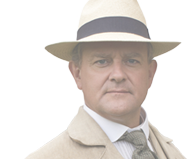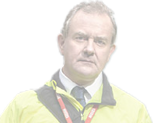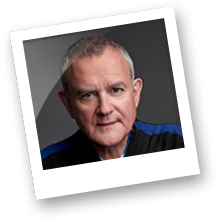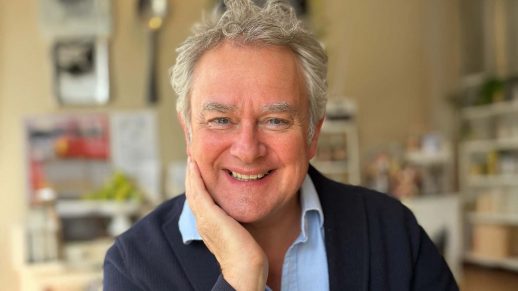Interview by Dorian Lynskey for the i Paper
Acclaimed British actor Hugh Bonneville opens up about ‘Downton Abbey’s’ final film, bringing the world of ‘Paddington’ to life, and the inspiration behind his new children’s book
Hugh Bonneville knows what you’re thinking. He is one of Britain’s most successful and recognisable actors, whose roles in the global sensations Downton Abbey and Paddington alone make him a not insignificant contributor to the UK’s soft power. Now, at the age of 61, he’s publishing the first of three books for children, Rory Sparkes and the Elephant in the Room. The audacity!
“As the great Simon Pegg once said, the word ‘celebrity’ is like having ‘c**t’ written on your forehead,” Bonneville says cheerfully. “You’re already off to a bad wicket.” Calling from his home in Hampshire, he requires no warming up. If your mental image of Bonneville is posh and charming, well, he’s both of these things, with a sunny confidence and an instinct for self-mockery.
Sometimes, though, that backfires. Last year, he tried to anticipate scepticism by joking to Radio 2: “Anybody who’s been on telly now has it in their contract that they have to write a children’s book. So I am fulfilling that obligation.” Outrage, and an apology, ensued. “I mistakenly made a thing called a joke,” he says. He’s responded by inviting full-time children’s authors to co-star on his book tour to share the publicity dividends. “It’s not just about me trying to stampede into other people’s territory,” he insists. “It’s not my full-time job but it is something I care about.”
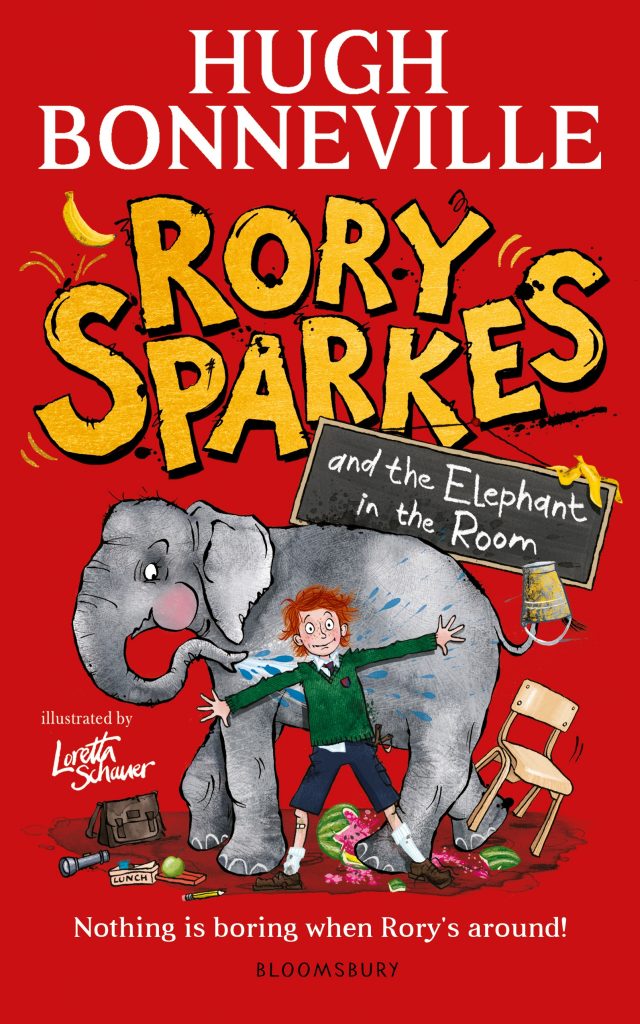
The cover of Hugh Bonneville’s new children’s book ‘Rory Sparkes and the Elephant in the Room’
The idea for Rory Sparkes sprang out of his delightful 2022 memoir Playing Under the Piano. “My commission was 100,000 words,” he says. “I thought they’d be thrilled when I delivered 165,000: nearly two for the price of one!” They were not thrilled. “My editor said, ‘I’m enjoying it, don’t get me wrong, but I’m on page 100 and you’re still only eight. Can we crack on a bit?’”
Pages were ruthlessly slashed, but his memories of his childhood in Blackheath in south London were so vivid that his agent’s colleague suggested channelling them into a book for children. “And I said, ‘Why? There won’t be any wizards or time travel or anything like that.’ And she said that often young readers, and certainly their parents, might be relieved there are no spaceships.”
The book is a winningly old-fashioned yarn about a 10-year-old’s adventures with siblings, schoolmates and a visiting circus, based on the one that struck camp on Blackheath every year. The circus kids attended his primary school and one did indeed come to school on a baby elephant. “I don’t think health and safety would let that happen these days.”
His 1970s nostalgia had to pass through the filter of a sensitivity reader. “That was a difficult weekend,” he sighs. What sort of things came up? “Please could I avoid the words cowboy and cowgirl and say cowhand instead? And I said ‘No, f**k off, actually.’ I get that you don’t want to cheese people off for no reason but there’s a limit.”
Hugh Richard Bonniwell Williams was born in Paddington (yes, ha ha) in 1963. His father was a urological surgeon and his mother a former nurse who, he discovered only decades later, worked for MI6. “I opened the newspaper and it said ‘MI6 Building to Be Sold,’ and I said, ‘That was your office!’”
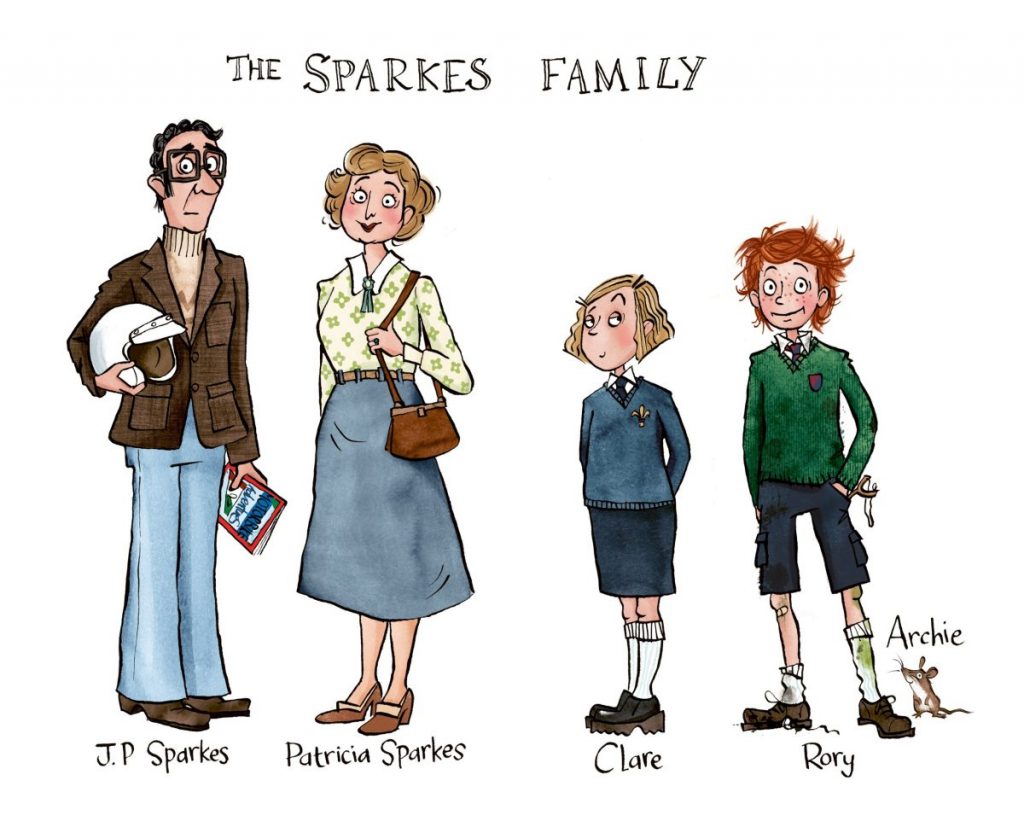
The book follows the adventures of 10-year-old Rory Sparkes with siblings, schoolmates and a visiting circus (Photo: Rosi Crawley)
Bonneville’s childhood was loving but fragmented. His sister and brother were respectively six and eight years older and all three were sent away to boarding school — he went to Sherborne at 13. “That’s probably why my imagination ran riot as a kid,” he says. “I was alone a lot. I find the British middle-class notion of sending your children away more and more confusing as I get older.”
He’s talked before about experiencing panic attacks at Sherborne. Was it a good environment for him? “I don’t know,” he ponders. “My closest friends are from that era but if I had my time again, I’d be at day school, no question. I’ve read books about the boarding school damage that you can see in certain [politicians] who are told that they are leaders of men but actually have very little internal emotional infrastructure. Maybe that’s one of the reasons I love exploring characters — they’re escapes into another world.”
Bonneville was always acting: at home, at school, at the National Youth Theatre, at Cambridge University while studying theology. Under the name Richard Bonneville, he spent his 20s as a stage actor, working with people like Ralph Fiennes, Kenneth Branagh and Judi Dench. He was blissfully happy. “I had absolutely no intention or expectation of doing TV and film,” he says. “I genuinely thought that was something Americans did and we probably had the upper hand in theatre.”
It wasn’t such a big leap after all. When he joined the ensemble of friends in 1999’s Notting Hill and earned a Bafta nomination for playing the writer John Bayley in 2001’s Iris, he already knew most of his co-stars from the stage. One notable exception was Julia Roberts. The Notting Hill cast were nervously awaiting her Hollywood arrival at the read-through but she walked in wearing jeans and a T-shirt and broke the ice by asking for a cigarette. “She just got on with it. All the finest actors I’ve worked with are completely down-to-earth.” The tricky ones, he finds, are those “who have got a slight chip on their shoulders — who feel they should be more famous than they are”.
After two dozen films, countless plays and plenty of TV, Bonneville only became properly famous himself as Lord Grantham in Downton Abbey in 2010. “People would often say, ‘You must have been so relieved when Downton Abbey came along,’ like I’d been struggling for 25 years. I’d had a really happy career. But it’s made a vast difference to my life. I would never have met the bear and I would never have done a movie with George Clooney [The Monuments Men].”
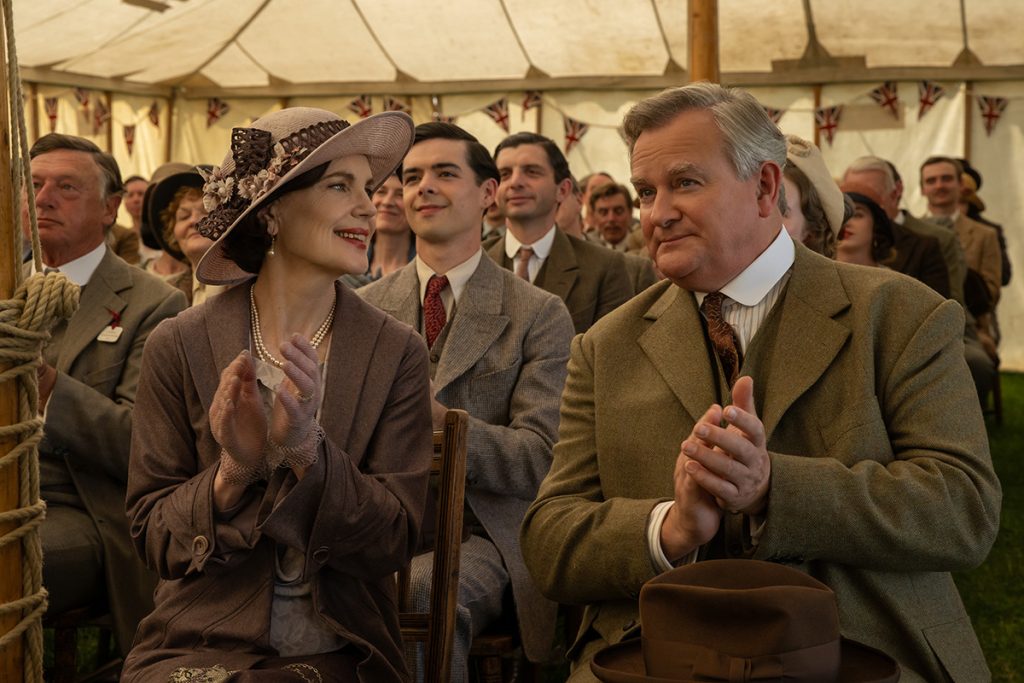
Cora Grantham (Elizabeth McGovern) and Robert Grantham (Hugh Bonneville). Credit: © Rory Mulvey/Focus Features LLC
So much depends on chance, he says: “If the butterfly hadn’t flapped its wings and that kind of thing…” For example, if he’d passed his audition for Jorah Mormont in Game of Thrones (Iain Glen got the part), he wouldn’t have been available for Downton. Even when it launched, an upstairs-downstairs soap opera about the denizens of a Yorkshire estate during the reign of George V didn’t seem like a sure-fire hit, because costume dramas were deemed old hat.
Bonneville recalls talking to executive producer Gareth Neame about signing a three-year option. “He said, ‘Don’t worry, we all know these things don’t run for more than one year.’ No one thought it was going to work. The groundswell of affection has been extraordinary. It really hasn’t stopped.”
Flushed with new career opportunities, the cast said their farewells in 2015, so each of the three subsequent films has been a pleasantly surprising reunion. “Having been in this business for as long as I have now, I think it’s a miracle that anything ever gets made because there are so many pitfalls. The fact we’ve made three films is testament to the fact we all got on.”
Paddington, too, exceeded expectations. Even Bonneville was uncertain whether the film-makers could make the bear convincing. “It could have fallen flat,” he says, chuckling at an incoming anecdote. “When Hugh Grant’s dad came to watch the second one, after about two minutes he tapped him on the shoulder and said” – he puts on an extremely poshly voice – “‘Is that a real bear?’”
These two international phenomena made Bonneville a kind of cultural ambassador for the UK. With the cast of Downton, he visited Barack Obama’s White House and appeared on The View with Barbara Walters. “She got really quite cross that I was wearing jeans and not tweed,” he laughs. “People assume you must have servants and a Labrador and I really don’t. I’ve got a VW Golf that’s just broken down.”
The third film, out today, has the emphatic subtitle The Grand Finale. “We thought it was all over,” he says. “It is now.” Is Paddington in Peru also a finale? “I’m sure they’ll want to make more but no one is indispensable. I think I’ve probably had my last dance on that one because I’m getting a bit old now.”
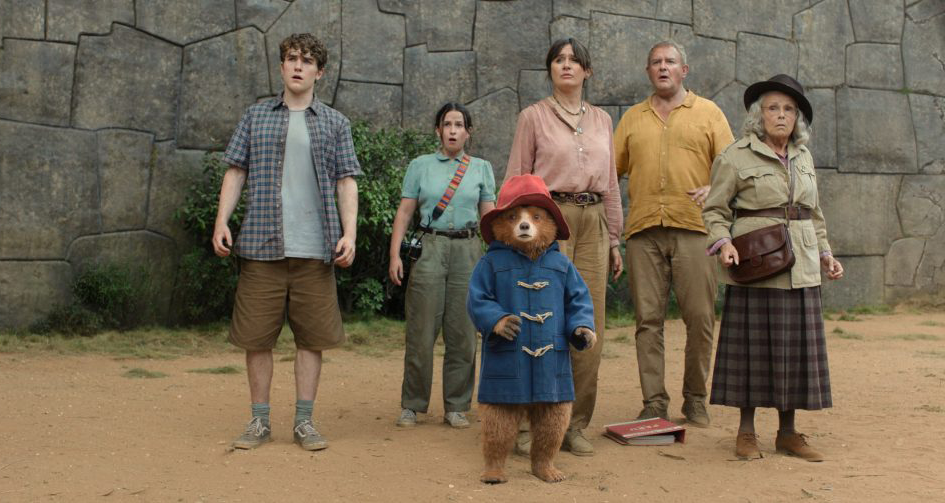
Hugh Bonneville played Henry Brown in ‘Paddington In Peru’ (Photo: StudioCanal)
He is, though, returning to the character of Ian Fletcher, the perpetually harassed troubleshooter in John Morton’s series of BBC sitcoms about the chaotic office politics behind the scenes of national institutions. Having helped to organise the London Olympics in 2012 and revamp the BBC itself in W1A, Fletcher will be working on the men’s football World Cup in 2026.
Bonneville gets wistful thinking about 2012: “It’s the last time I felt that Britain was truly passionate about itself and united.” Given that the 2026 tournament will be split between Mexico, Canada and an increasingly xenophobic USA, the context is somewhat more troubled.
“It is inherently odder and darker,” Bonneville agrees. “But the point with John Morton is it’s not really about the Olympics or the BBC, it’s about the bonkersness of office life.”
He recently starred in Uncle Vanya in Berkeley and Washington DC. “It was interesting being in DC as the rise of the machines, if you like, was just starting.” He means the Trump administration. “Very strange atmosphere, I have to say.”
Bonneville represents two romanticised visions of England in Paddington and Downton, and often plays establishment figures (Samuel Pepys, Lord Mountbatten, a DCI in The Gold), so he was a smart choice to host King Charles’ coronation concert in 2023, though he characteristically frames it as a sitcom mishap. “What I had in my head was a chamber quartet and a couple of poems by Shakespeare. Gradually you realise its 20,000 people and beamed all over the world. I was so naïve.”
What he’s doing next is to-be-confirmed, apart from a role in Guy Ritchie’s Netflix crime drama The Gentlemen. Two of his Paddington 2 co-stars have made improbably terrifying horror movie debuts of late: Hugh Grant in Heretic and Sally Hawkins in Bring Her Back. Would he fancy that?
“Oh yeah,” he says. “To be able to emerge from a different kennel sometimes is nice. But I’m not an idiot. I’m going to play to my strengths as well.” His most villainous role in recent years was a silkily menacing retired judge in the 2022 thriller I Came By — a welcome departure from being professionally genial.
Another anecdote bubbles up. “I said to my agent, ‘I love it but why do you think I should do it?’ And she said, ‘Because there’s no Labrador and there’s no f**king bear!’”
‘Downton Abbey: The Grand Finale’ is in UK cinemas now. ‘Rory Sparkes and the Elephant in the Room’, illustrated by Loretta Schauer, is published by Bloomsbury on 9 October



